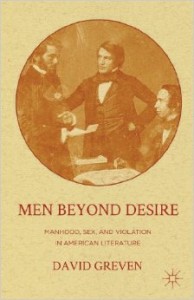 Men Beyond Desire: Manhood, Sex, and Violation in American Literature
Men Beyond Desire: Manhood, Sex, and Violation in American Literature
by David Greven
Palgrave Macmillan. 294 pages, $65.
ANDREW JACKSON captured the White House in 1828 by turning himself into a symbol of American manhood, a tough backwoodsman who dressed, spoke, and acted the part. David Greven believes that Jackson’s construction of manhood—white male power rejecting any hint of weakness and willing to use violence—has prevailed in American culture to this day. Certainly the example of our current president, whose political persona is based almost entirely on simplistic images of manliness, supports Greven’s belief. Jackson’s masculine performance included killing a man in a duel and winning the Battle of New Orleans, whereas George W. Bush’s must rely on staged events, which suggests that this construction is losing its authenticity if not its appeal.






